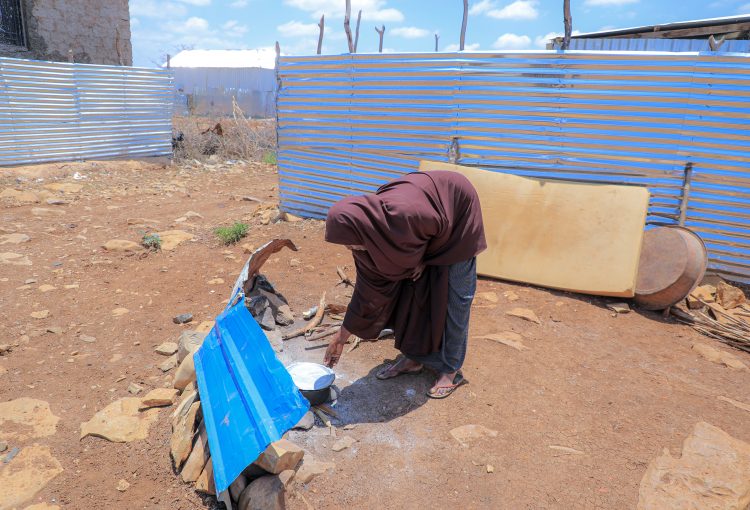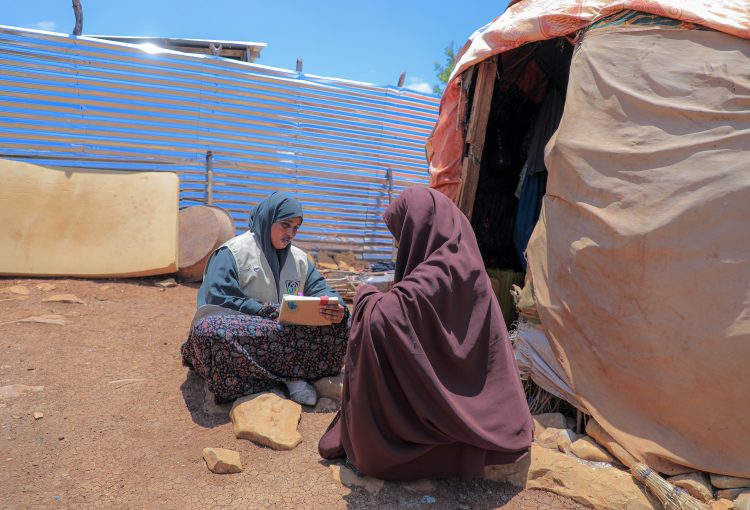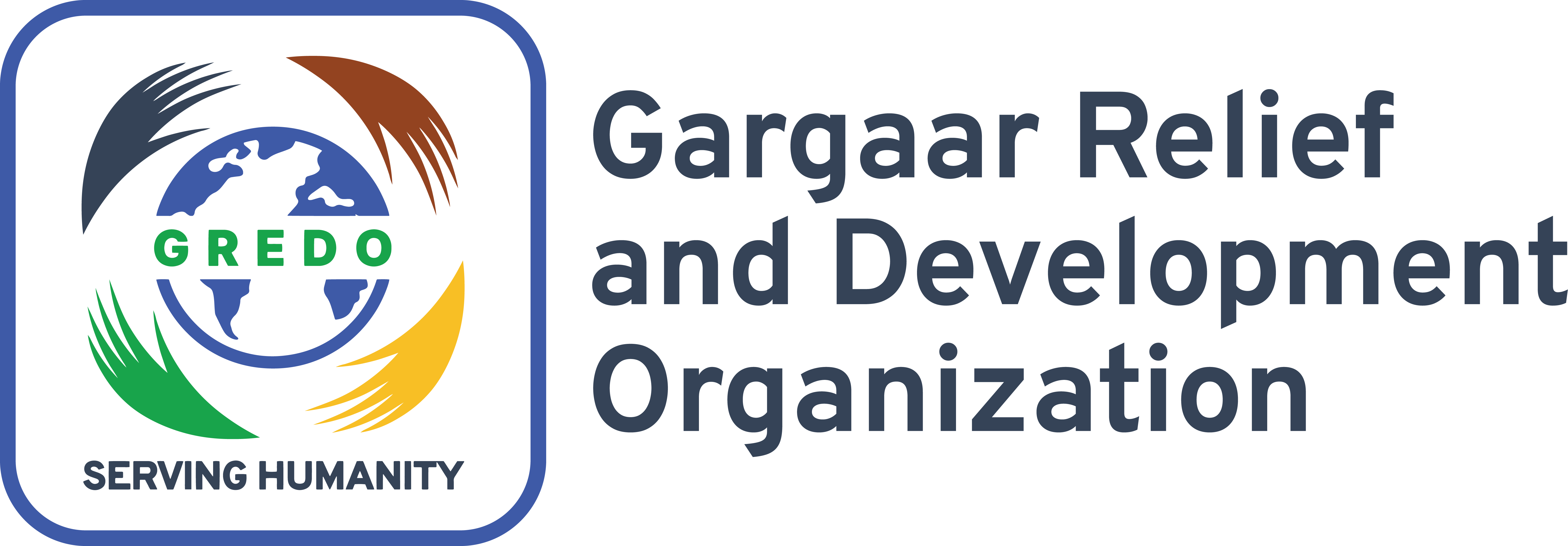“When I received the support, it was not just money or food, it was dignity. It reminded me that I am still human.”
Nuney*, a 35-year-old mother of four, now lives in the Idaale 1 IDP camp in Baidoa after fleeing extreme hardship and repeated abandonment. Her journey from Qansahdhere to the support structures in Baidoa is a powerful example of how timely humanitarian intervention can restore not only a person’s livelihood but also their dignity. With the help of GREDO’s GAASHAAN project, funded by FCDO, she has received vital support, psychosocial counseling, material aid, and cash assistance that has helped her begin to rebuild her life. Nuney’s* story is one of resilience, strength, and the importance of community in overcoming trauma.
Before displacement, Nuney* lived with her four children in Qansahdhere village, surviving through pastoralism and seasonal farming. Her livelihood was simple and weather-dependent, farming during rainy seasons and rearing two goats. Her personal life, however, was marred by betrayal and abandonment. The father of her first three children abandoned her left when she fell critically ill. Her family then requested a divorce on her behalf. Later, she remarried and became pregnant with her fourth child, only to be abandoned again—this time just weeks before delivery. With no source of income, she sold her two goats and used the money to travel to Baidoa by vehicle with her children.
 Nuney* cooking in her open kitchen, using a traditional firewood.
Nuney* cooking in her open kitchen, using a traditional firewood.
Upon arrival at Idaale 1 IDP camp, Nuney* was allocated a small makeshift shelter constructed from tarpaulin and fabric. It offered little security, but it was a place to start. On the second day, a neighbor visited her and, after hearing her story, provided her with the GREDO hotline number (9997). Though hesitant and unsure, Nuney* mustered the courage to call. That call marked a turning point. She was connected with Nima Abdullahi, a compassionate social worker under the GAASHAAN project.
Through this connection, Nuney* was enrolled in GREDO’s comprehensive case management program. The support began with psychosocial counseling to address her emotional trauma. Following a detailed needs assessment, she was given a cash grant of $99 on two occasions, amounting $198. With it, she bought food and essentials for her children. She also received a mattress, mosquito net, bedding, and clothing, items that may seem small but provided immense relief and comfort.
Just five days after her arrival, Nuney* gave birth alone in her shelter at night. With no medical assistance and no partner by her side, the baby nearly fell onto a stone during delivery. She described it as one of the scariest moments of her life. Despite this trauma, she remained strong and determined to care for her newborn and three other children.
Life in the camp remained difficult. Food was scarce, medical services limited, and her children could not attend school. She often had to ask neighbors for food. The continued absence of the children’s fathers and the struggle of single motherhood weighed heavily on her mental health. Yet, she found comfort in the counseling and emotional support she received. “Speaking to the social worker was the first time someone truly listened to me. I did not feel invisible anymore,” she shared.
GREDO’s support, although limited in resources, gave her the strength to keep going. With peer support, psychosocial counseling, Nuney* began to regain a sense of agency and hope. She dreams of enrolling her children in school and building a stable life for her family. Though challenges remain, she now feels less alone.
NUNEY’S* STORY
My name is Nuney*. I am a 35-year-old mother of two girls and two boys. We are an extended family of five, and for the past year, we have been living in Idaale 1 IDP camp. Before coming here, we lived in Qansahdhere Village where we survived as pastoralists and subsistence farmers. We only cultivated during the rainy season—sorghum, maize, and beans. I personally kept two goats to support our household.
Life was already difficult, but it got worse when I became critically ill. The father of my three children left us during that time. He never returned. My family urged him to divorce me since he had no intention of coming back—and he did so without hesitation. I later remarried and became pregnant with my fourth child. However, that husband abandoned me as well, even before the baby was born.
I was almost nine months pregnant, jobless, and had no income. Out of desperation, I sold my two goats and used the money to travel with my children to Baidoa. Upon arriving at the IDP camp, I was given a shelter made of tarpaulin and plastic. It was small but it was better than nothing. One of my neighbors came to visit and I told her everything. She gave me the GREDO hotline number and urged me to call. I was hesitant, but the community encouraged me.
 Nima, in a light vest (left), is interviewing Nuney* in a maroon hijab (right) outside her shelter.
Nima, in a light vest (left), is interviewing Nuney* in a maroon hijab (right) outside her shelter.
When I finally called, Nima from GREDO answered. She listened to me carefully. That moment changed everything. I was enrolled into their case management system, received emotional counseling, and was given cash support of $99 for two occasions amounting to $198. We also received material assistance -clothes, bedding, and a mosquito net.
Just five days later, I gave birth at night, alone. My baby almost fell on a stone. I cried all night. My partner had already left us. I had no help, no food, and no hope. The children were hungry. There were nights when they cried, and I had nothing to feed them. I begged my neighbors for food.
But through GREDO and their partners, I received psychosocial support and emergency help. The counseling helped me talk about my pain. For the first time, someone listened to me. I felt seen. The money helped me buy food and clothes. Gradually, I began to feel a sense of stability.
Today, I still face challenges. There is not enough food, healthcare is hard to access, and I cannot afford to send my children to school. But I am no longer completely alone. I now have the strength to try every day and hope for a better future.
I am thankful to GREDO and all the people who made this possible. They gave me more than just money, they gave me my dignity back.
BACKGROUND/PROJECT INFORMATION
The GAASHAAN Project is a life-changing humanitarian initiative funded by the Foreign, Commonwealth & Development Office (FCDO). Designed to provide long-term assistance in Somalia, GAASHAAN addresses critical needs like gender-based violence (GBV), child protection, psychosocial trauma, and emergency relief.
Led by Save the Children in collaboration with organizations like GREDO, the program directly reaches over 43,000 vulnerable individuals across 18 districts in 9 regions. An additional 117,000 people are reached indirectly through awareness and advocacy initiatives. The goal is not just to respond to emergencies, but to rebuild lives, offering women like Nuney* a second chance.
Through holistic case management, counseling services, and community-based protection structures, GAASHAAN ensures that no one is left behind. The program empowers individuals through financial support, livelihood training, legal advocacy, and emotional healing. In doing so, it fosters resilience and gives hope to those caught in cycles of violence, abandonment, and poverty.
Nuney’s* story is a powerful example of what can be achieved when compassionate intervention meets personal strength. Her path from despair to hope illustrates the very essence of what GAASHAAN stands for: restoring dignity, ensuring safety, and building brighter futures.

